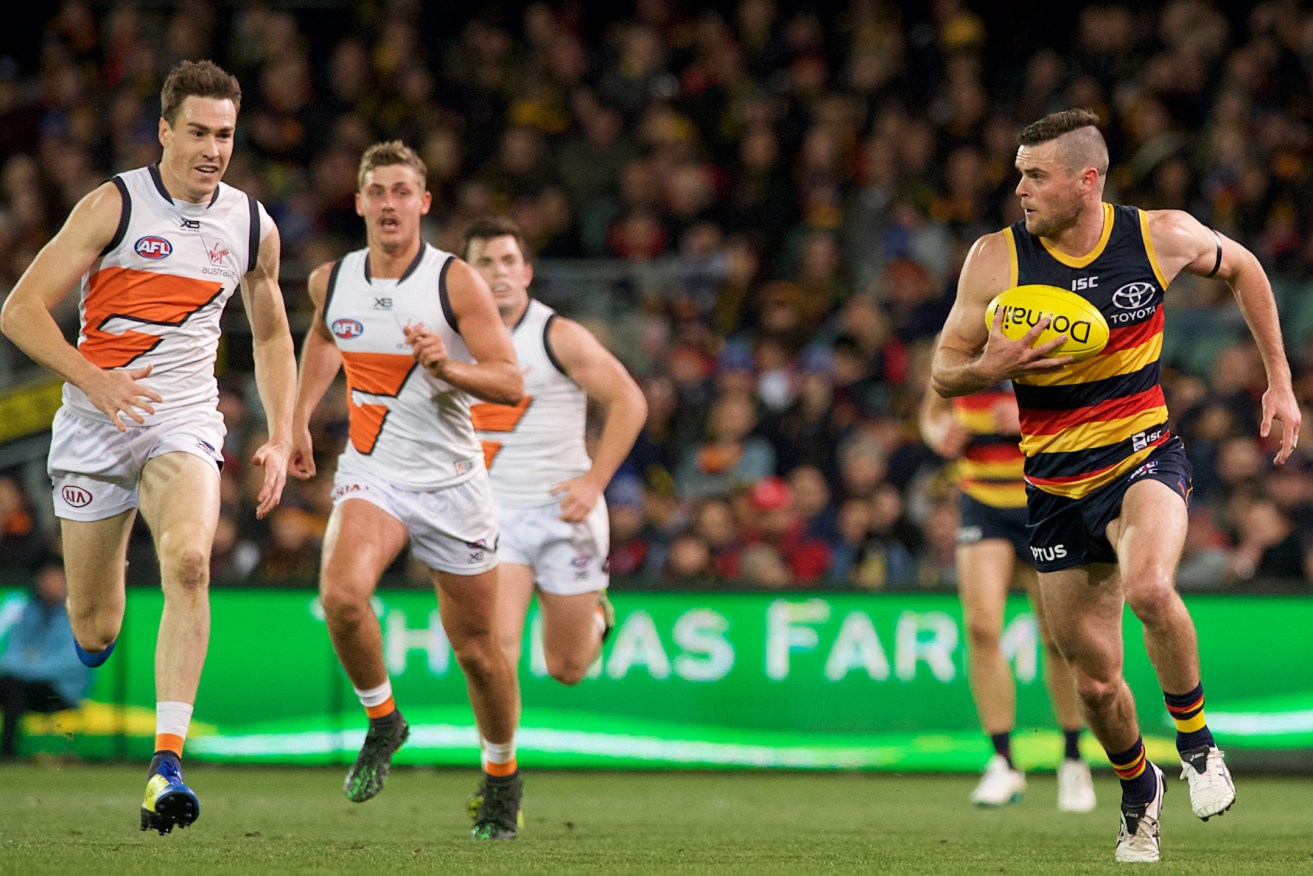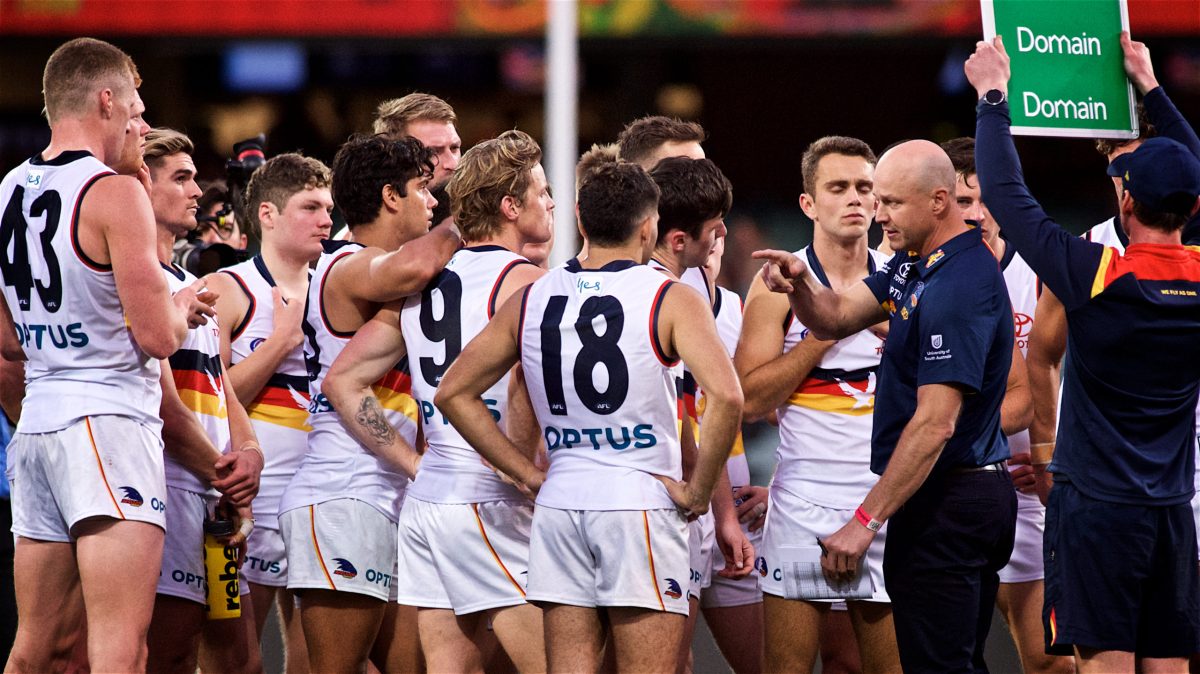Recruiting master’s definitive view on Crows’ conundrum
An AFL season to forget closes for the Adelaide Football Club this weekend, and then the Crows must work their busiest ever trade and draft agenda. Michelangelo Rucci asks a former AFL master in recruiting and list management about how the club should tackle the critical decisions ahead.


Brad Crouch's future is key to unlocking the Crows' list management strategy. Photo: Michael Errey/InDaily
To be with Brad Crouch? Or not to be with Brad Crouch?
This is the question that headlines the Adelaide Football Club agenda in its most critical list-management build since the inaugural Crows squad was picked 30 years ago.
And seemingly everyone has an answer. But not the answer while Crouch’s future is clouded by his right to take up AFL free agency after eight years at the Crows.
Former Crows midfield coach Scott Camporeale says Adelaide must keep 26-year-old Crouch, but adds the provision of offering no more than a three-season contract extension.
Crouch’s management, after almost securing a $900,000 deal from Gold Coast last year, is aiming for a five-year deal. Long tenure replaces big money in Crouch’s chase for security during the game’s uncertain times.
Former Western Bulldogs and Richmond coach Terry Wallace, the so-called “list manager” for his studious work in analysing AFL squads, insists Adelaide must let Crouch walk, with the prospect of the Crows scoring the No.2 draft pick from the AFL as compensation for losing the restricted free agent (that is a player in the top 25 per cent of the payroll at West Lakes).
“Do I think Matt Crouch, Brad Crouch and Rory Sloane can play together in the midfield? No,” said Wallace.
Opinion on Crouch – whether to keep and whether to buy – is further complicated by questions about the soundness of his body. Since his AFL debut in 2013, Crouch has played just 94 of a possible 172 senior games. His 2018 season was wiped out by a groin injury that required major surgery in Sydney to save his career.
Saturday’s season-closer at Adelaide Oval against Richmond could mark Crouch’s last match as a Crow. He will be briefed next week by his manager on all the free-agency offers presented recently, the most notable from Geelong where Brownlow Medallist and former Crows midfielder Patrick Dangerfield is the strongest advocate for a recruiting move on Crouch.
Crouch could depart having taken the applause as the 2019 Malcolm Blight Medallist as Adelaide’s club champion, but never seeing a run-through banner acknowledging his 100th-game milestone as a Crow. That milestone might be passed in a Geelong, Carlton or Essendon jumper in his home state of Victoria.
Crouch is one part – a big part – of the enormous challenge faced by under-fire Crows list manager Justin Reid and Adelaide football director Mark Ricciuto in delivering a new squad to rookie coach Matthew Nicks.
Very few can appreciate the complexities of list management with the domino effect triggered by contract renewals, trades and drafting. In Adelaide, the most successful operator in recruiting – and list building – is former Central District SANFL league coach Alan Stewart – the man who constructed Port Adelaide’s breakthrough 2004 AFL premiership squad.
When the AFL flag was unfurled at Alberton, Stewart crossed Port Road to join the Adelaide Football Club. Many note the Crows have been poor in list-management decisions since he retired at the end of 2017, after his work culminated in Adelaide’s first grand final appearance in 19 years.
Stewart has been troubled by serious ill health this year, but his sharpness on managing an AFL list remains. His observations – not only of Adelaide but of the list-management methods at all 18 AFL clubs – are so strong for delivering focus amid the increased uncertainty in AFL football today while list sizes and the salary cap for 2021 and behind remain unresolved.
If everyone is going to have an opinion on Crouch, why would Stewart not be asked the question that from Monday is going to further dominate the start of Adelaide’s busy off-season?
“I’d retain Brad,” says Stewart. “We’ve seen in the past month what you get with Brad around the ball. He applies pressure on opposition midfielders; he creates lots of opportunities to get the ball going forward; he is pretty important to that midfield because he is a naturally fierce competitor.
“Who are you going to bring in to fill that role if Brad goes?
“And keep in mind how the two brothers (Brad and younger sibling Matthew) play so well when they are together in that midfield.”
As with Camporeale, Stewart has the proviso – no five-year contract, even if this will be required to stop Crouch using free agency to accept an offer from a Melbourne-based club, in particular at Carlton or Essendon.
“I would not give anyone a five-year contract,” said Stewart. “Look at how players lose their edge when they get those long-term deals.”
Stewart regards Crouch as a critical player in turning Adelaide from the wooden spooner to a premiership challenger.
“And you can turn around your fortunes quickly… if you know what you are doing,” Stewart says.
This is where list management – an international sporting challenge that has spawned concepts such as “Moneyball” – becomes loaded with theory, “experts” and endless critics working with the benefit of hindsight.

Apples with apples: how does Matthew Nicks’ performance compared with another first-year coach, Justin Longmuir at Fremantle? Photo: Michael Errey/InDaily
Stewart has a proven track record – and the understanding that building a successful AFL team comes with successfully linking many parts in a football club.
“Port Adelaide,” says Stewart, “has had good list management, smart recruiting and good assistant coaches build a good team (for senior coach Ken Hinkley).”
Stewart also is old school in labelling “rebuilds” as a “cop-out”.
“Be careful when you hear rebuild, it is a cop-out – it is usually the way to cover up poor decisions made (with list management),” Stewart said.
Stewart prefers to compare “apples v apples”: the progress of the Adelaide and Fremantle football teams this season.
Both have first-time coaches – Nicks at Adelaide; Justin Longmuir at Fremantle.
Fremantle, notes Stewart, has three so-called A-graders – Brownlow Medallist Nat Fyfe, Michael Walters and David Mundy.
Adelaide has five players honoured with All-Australian status – club captain Rory Sloane (2016), midfielders Matt Crouch (2017) and Rory Laird (2017 and 2018) and defenders Brodie Smith (2014) and Daniel Talia (2014 and 2016).
“And a group of 10-12 players who make up a better list than at Fremantle,” says Stewart. “What I’ve liked about Justin Longmuir is he and his clubs have just got on with it…”
The results so far in season 2020 show Fremantle played with a competitive edge to have seven wins from 16 matches, while Adelaide will likely collect its first wooden spoon after being without a win during the first 13 matches before stringing together three consecutive wins this month.
“The question you have to ask at list management,” says Stewart, “is how many players do you have for your next premiership?”
Stewart still recalls how he and Chris Pelchen kept building this critical “premiership winners” count at Port Adelaide and how he and David Noble, before the Crows football boss moved to Brisbane in 2016, were counting as many as 16 spots filled for Adelaide’s next premiership line-up.
“List management is all about asking which players are going to be there for your next premiership – and who do you have to develop to win a flag,” Stewart said.
“If you let people go, how do you replace them? When the Crows lost a genuine A-grader (future Brownlow Medallist) Patrick Dangerfield (to Geelong by a trade in his free agency year of 2015), did the player list become better at Adelaide?”
At the end of 2015, on the arrival of Don Pyke as senior coach, Adelaide gained Paul Seedsman, Troy Menzel and Dean Gore via the trade market – certainly not enough to immediately counter the loss of Dangerfield. The long-term play with draft picks did put future captain Tom Doedee and Wayne Milera on the player list.
Dangerfield headlined the exits from West Lakes that included James Podsiadly, Brent Reilly, Matthew Wright, Brodie Martin, Sam Kerridge and the untried trio of Sam Siggins, Jack Osborn and Anthony Wilson.
“It is a balancing act (working list management) – and if you know what you are doing, you can turn around a team’s fortunes to have those players who can win you a premiership within three or four years,” Stewart said. “If you know what you are doing …”
Adelaide’s strategy for the November trade period leading to the AFL national draft is drawing speculation that as many as 12 players will start clearing their lockers at West Lakes next week.
High-priced Carlton recruit Bryce Gibbs already has, despite a year remaining on his contract. So has free agent Rory Atkins, who is expected to collect a significant long-term contract from Gold Coast.
The Crouch question? A year ago, it was about money – and the AFL market was not keen to allow Crouch to hold a contract worth $1 million a season. Now, with COVID having wrecked the game’s finances, Crouch will use his free-agency card to secure a long-term deal.
Nicks is compelled to rely on his list-management team to measure the merit of giving Crouch more than three years to avert a move to a Victorian-based rival.
In a most pragmatic tone, Nicks says: “That’s free agency… that is what we deal with now. It is challenging for both parties.
“It comes down to, in the end, where exactly where Brad wants to be, what his manager wants to do and what other clubs will come to offer Brad.
“I love what Brad brings as a footballer,” adds Nicks who started his coaching mantra at Adelaide emphasising “contests, contests, contests” – a theme Crouch embraces by his competitive nature.
“There is a certain value attached to that (in terms of salary and tenure). And as a club, we have to weigh up where we are heading. There is still a lot to go through with that.”
The AFL trade period this year will be – free agency, October 30-November 6; trades: November 4-12.
The national draft will run from December 7 with Adelaide currently holding the No.1 pick: that would be a first for the Crows.
For the rest of the AFL season, you can read news and insights from Michelangelo Rucci – SA’s most experienced and credible football writer – every Friday in InDaily.




